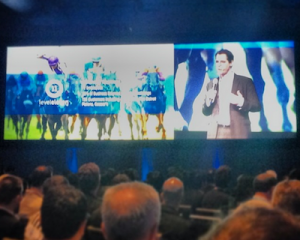On Monday morning at the Salesforce Dreamforce conference I was honored to have been asked to do a short Q&A at the Partner Keynote. I was thrilled to get up there in front of quite a crowd to share our story. We received great feedback from the attendees so thought I would share a summary of the Q&A in in a post here. Here’s a write up of my discussion with Leyla Seka, VP of Platform Product Management, AppExchange & ISV.
Leyla: So tell us how you got started?
 Bob: Before founding LevelEleven, I was in sales and sales leadership at ePrize, a high growth technology company based in metro-Detroit. Spent 12 years there from startup to exit, and worked with some of the worlds largest brands like General Mills, Target, Ford, American Express and dozens of others on how to motivate consumer behavior using contests, sweepstakes, and loyalty programs. I was charged by our CEO, Matt Wise, with implementing Salesforce for our 100+ person sales organization, and in that process thought, “what if we could somehow take that same ePrize idea bring it inside of an enterprise to motivate salespeople.”
Bob: Before founding LevelEleven, I was in sales and sales leadership at ePrize, a high growth technology company based in metro-Detroit. Spent 12 years there from startup to exit, and worked with some of the worlds largest brands like General Mills, Target, Ford, American Express and dozens of others on how to motivate consumer behavior using contests, sweepstakes, and loyalty programs. I was charged by our CEO, Matt Wise, with implementing Salesforce for our 100+ person sales organization, and in that process thought, “what if we could somehow take that same ePrize idea bring it inside of an enterprise to motivate salespeople.”
I went to Matt with the idea of a simple to use tool that could be put in the hands of a sales manager to create energy around the key behaviors they want their team focused on, by tapping into salespeople’s competitive nature. It would take the behaviors as they’re tracked in Salesforce, and create high impact, real-time leaderboards in Salesforce, on TV’s, in Chatter, in their email inbox, and on their phones.
He loved the idea, giving me 2 engineers and 3-months to see what we could figure out. We launched the beta version (and when I say beta – I mean very scrappy) at Dreamforce 2011. Two weeks later we signed our first paying customer, the next month we signed a 100-person sales team for a manufacturing company in Chicago and the next month we signed Comcast’s 2000 person sales organization. After about 6-months of nice progress, we decided this shouldn’t be a side project anymore, it should be it’s own company. So I went and raised $1.5M in venture capital on this idea, got a killer engineer/CTO in Kevin O’Hara, and then spun out of ePrize and launched as our own company in October 2012.
Leyla: How’s it going now?
Bob: We just keep growing. We’re up to 13 full time employees, we’ve raised over $3.6M in venture capital, have over 125 customers including those I already mentioned as well as OpenTable, Concur, the Detroit Pistons, Caesars, and many others.
Leyla: And how have you used the AppExchange in your business?
Bob: The AppExchange continues to grow in importance for our business. In the beginning we were just listed there, and we very quickly started putting more and more energy into it – refining our listing, our design, our messaging, promotion, etc. Today about 25% of our business is sourced from the AppExchange, and our win rates are higher there than any other channel. We’ve also been investment more there from a marketing standpoint because after all – we’re fishing where the fish are.
Leyla: What advice would you give to people in the room looking to get started on their own business idea?
Bob: Just start somewhere. Don’t work in your little vacuum of a product idea for too long. The very first step I took after having this vision in my head was that I put the idea on paper and draw it out step by step. I then took those basic images, and started working the Salesforce community. I talked to our Salesforce Account Executive and his manager to get their thoughts and feedback. They then introduced me to a couple of their customers to get feedback. I then started calling leaders at other companies who were having success in the Salesforce ecosystem, some of whom are in this room, asking how they got started, what advice they would give someone like me starting out, etc.
The community was just awesome and so glad and supportive to see more activity and ideas coming onto the platform. The more I opened up, the more ideas I got on how to make the product better and the more excited I got. So don’t hold back, and just get something built that you can show people. As I mentioned earlier, when we launched the beta version at Dreamforce 2011, the product was very raw – but it was functional. Honestly, if we didn’t have that self imposed deadline of being live by Dreamforce, we would have tinkered for months and I think that would have been a waste of time.
We didn’t get to these other questions, but here’s a couple other things we considered covering if we had a little more time…
Why build on the platform?
This has been a huge advantage for us out there as being a small company, it puts us in a position to sell to huge enterprises like Kelly Services, Stanley Black & Decker, Comcast, and several others. Because they’re not buying into the technology platform of some small little startup, they’re extending the trust they’ve already placed in Salesforce in terms of uptime and security. That’s a big advantage. In addition, it allows our engineering team to be highly focused because we know exactly what we’re dealing with so we can get more done with less people. It also helps our sales and marketing efforts because we’re all speaking the same language as our customers.
LevelEleven is based in Detroit – can you tell us a little about launching a technology startup there?
I’m so proud that we’re in Detroit. Detroit doesn’t have the best reputation, but I can tell you there is a serious resurgence happening there. As many know, the city recently filed for bankruptcy which as an outsider looking in sounds really bad. But for those of us there, it’s a long time coming and is an opportunity to rip of the band aid and get a fresh start. We’ve got incredible supporters, including our lead VC firm Detroit Venture Partners, Dan Gilbert who is the founder of Quicken Loans, and a nice startup community developing very rapidly. In fact, our mobile app was built by one of them, Detroit Labs, which has become of the countries leading mobile app developers, so we’re all working together. It’s been great for us as everyone is pulling for Detroit – customers and prospects included. It’s great for recruiting as anyone who wants to be part of a startup wants to build something, so being in Detroit adds fuel to that because we feel like we can be part of rebuilding the city too.


